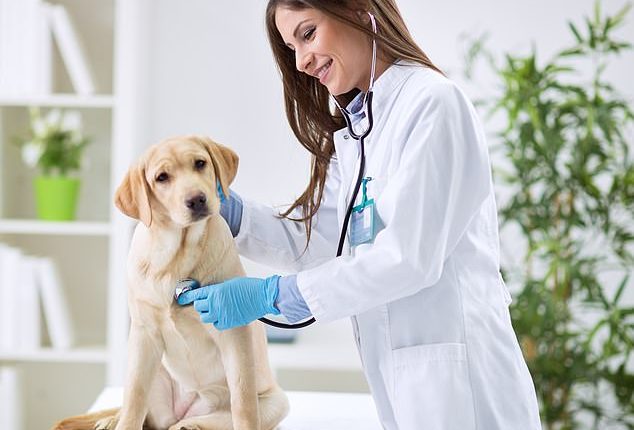Tens of thousands of pets across Australia may have become untraceable after a microchip and registry company suddenly stopped operating.
HomeSafeID, used by vets and animal shelters since 2009, has not been contactable since December.
A post was shared on the company’s website earlier this month stating it was ‘no longer communicating or paying for the hosting of this site, and so this site is likely to go offline in the future’.
‘You may want to investigate alternatives to your pet’s registration, as once this site goes offline the registration data will no longer be available online or searchable via PetAddress,’ the statement added.
It’s possible HomeSafeID has stopped operating or will do so soon.
It means that any pet with a HomeSafeID registered microchip would no longer have searchable microchip details.
If those pets become lost, vets and shelters would have no way of finding or verifying their owner.
Microchipping pets is a legal requirement in all states and territories of Australia except the Northern Territory, although it’s required in the City of Darwin.

A microchip and registry company used by vets may have stopped operating (stock image)
Australian Veterinary Association’s Dr Michael Hayward said tens of thousands of animals would be affected if HomeSafeID went offline.
‘In that event, veterinarians, animal shelters, local pounds, local governments and all other interested parties will not be able to identify an animal based on its microchip number,’ Dr Hayward told the ABC.
The Victorian government has de-listed HomeSafeID and microchip registries must be licensed with that state’s Agriculture Department.
The Victorian Agriculture Department website said pet owners would be contacted if they were registered with HomeSafeID.
Dr Hayward said the Victorian and Queensland governments kept data and could make it available to another provider.
‘We don’t know when that will occur. This issue has been brewing for months and the Victorian government hasn’t announced what it will do with the data,’ he said.
‘In the meantime, the logical course of action is that owners who wish to ensure their pet is recoverable in the event it goes missing should consider registering their pet and its microchip number with one of the other national private databases.’
There are currently seven registries in Australia.

Any pet with a HomeSafeID registered microchip may no longer be searchable
Five are privately owned, including HomeSafeID, and two are owned by state governments, in NSW and South Australia.
Hobart cat shelter Ten Lives has used HomeSafeID since 2017 and has microchipped 9,000 cats.
Ten Lives has been forced to change providers after losing contact with HomeSafeID.
Ten Lives president Paula Wriedt said the shelter couldn’t confirm the company’s status.
‘Letters sent to the director’s address have been returned to sender,’ Ms Wreidt said.
‘We are still investigating the matter, but we are not optimistic.
‘This means our adoption clients may not have a current, searchable microchip registration sometime in the near future.’
Registries generally charge $12 to $15 to transfer data and Ms Wriedt said it was a reminder for all pet owners to make sure their pet’s microchip details were up to date.
‘This is a great opportunity for those clients who have had cats from Ten Lives for a number of years, and who may have moved house in that time, to change to a new provider, but also to update their address details,’ she said.
Dr Hayward said the issue showed why there was a need for one central system.
‘There is a national database that applies to livestock, but as is so often the case, issues relating to dogs and cats fall between the cracks and are legislated at a state government and local government level,’ he said.
‘It’s left to the individual state and territories and sometimes individual local governments to manage these problems and that’s a very unsatisfactory situation.’
The RSPCA told people to search PetAddress using their pet’s microchip number.
‘PetAddress searches the Australasian Animal Registry, Central Animal Records, and PetSafe and, if your pet’s microchip is registered on one of these, it will redirect you to the database that lists your pet’s microchip number so that you may contact them directly,’ they said.
‘If you cannot find your pet’s registry by searching on PetAddress, you may like to contact your vet or microchip implanter to find out which database your pet is listed in.’
There are no rules, regulations or even guidelines around how private pet microchip registries should operate in Australia.







